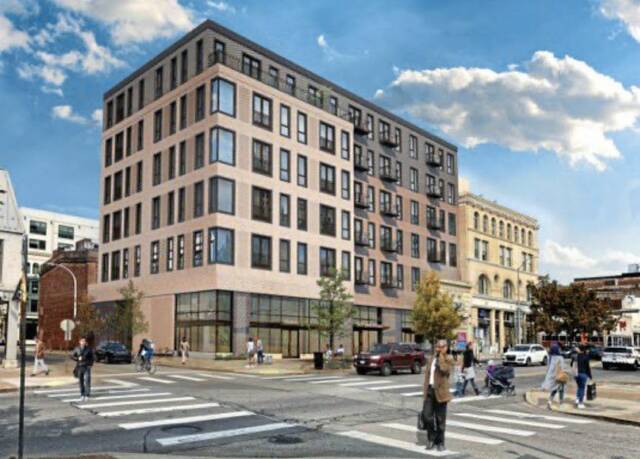A six-story, mixed-use development proposed for the 5900 block of Penn Avenue in East Liberty was delayed this week after a unanimous vote by the Pittsburgh Planning Commission.
The vote on Tuesday came after representatives from the Kelly Strayhorn Theater and other Pittsburgh residents raised objections to the development, and voiced concern that the owners, McKnight Realty Partners, weren’t showing enough of a commitment to the theater and offering a long-term extension on its lease.
The block contains four different buildings all on one parcel, which McKnight purchased in 2020 for $8.3 million. The proposed development would tear down one of the buildings to construct a 38-unit housing complex with retail on the first floor, according to McKnight attorney Bill Sittig. The Kelly Strayhorn Theater, its lobby, and the four-story building on the corner of Penn and Highland avenues would all be preserved. According to renderings, the housing development would be built over the theater and adjacent retail locations.
During a more than two-hour meeting, several board members from the Kelly Strayhorn Theater and more than a dozen community members objected to the proposal. The main concern was not with the building itself, which was even praised for its architectural design by some critics, but for the owners’ lack of commitment in extending the theater’s lease beyond its current parameters.
Caitlin Green, chair of the board of directors at Kelly Strayhorn, said the theater does not support the plan and accused McKnight of failing to complete adequate community engagement before seeking city approval.
“We are staple of this parcel and our work is integral to the community,” Green said. “We have substantial concerns about a lack of community engagement.”
Green said McKnight has not promised to extend the theater’s lease. Other speakers during the meeting were hopeful that McKnight might extend the lease for another 30 years, as a show of commitment to keeping the theater in the neighborhood long term.
Sittig bristled at the idea of an approval being contingent on extending a lease for a tenant, and defended the project. He said if the project was approved, access to the Kelly Strayhorn would remain at 100% throughout construction, and that retail tenants on the block would be given priority to return after the building is reconstructed.
He also praised the project for including four units that will be permanently affordable to tenants whose income is 50% of the area median income, and that the project will not create new off-street parking thanks to an agreement to allow residents to park at unused parking spaces at the Eastside Bond building a couple of blocks away.
Sittig added that the project has been supported by community organizations and nonprofits like East Liberty Development Inc. and Village Collaborative of East Liberty.
But some Pittsburgh residents who spoke at the meeting claimed those groups are not representative of the community. Those residents claimed that new residents above the Kelly Strayhorn would complain about noise from the theater, and also said that the community process should have been more thorough. Ultimately, however, the main source of the opposition came down to concerns about the theater’s lease.
Eric Vanistendael is a Lawrenceville resident and former employee of ELDI. He said at the meeting that McKnight and Village Collaborative of East Liberty don’t support the community, but they could show their support by working on a new lease for the theater.
“The building is a very well-considered architectural design,” Vanistendael said. “On one hand that is laudable, but on the other I think there are other issues. Like the lease issue, which is disingenuous. It really doesn’t matter if we build really pretty nice buildings, it is about who gets to remain in the community.”
East Liberty has become a lightning rod around gentrification in Pittsburgh, especially after the eviction of hundreds of residents at the Penn Plaza complex in 2016. The neighborhood has also lost hundreds of Black residents over the past decade, mostly replaced by white residents.
Related:
• Penn Plaza development continues to generate controversy
• Future of Penn Plaza site in East Liberty about to be finalized
However, East Liberty is also home to one of the largest percentages of subsidized affordable housing of any Pittsburgh neighborhood. Out of about 3,000 rental units in the neighborhood, roughly a third are permanently affordable, according to data from ELDI.
In the end, Pittsburgh Planning Commission Chair Christine Mondor sided with the opposition. She noted the design was sound, but that the commission voted to delay the vote on the proposal so that McKnight and Kelly Strayhorn might work out their differences.
“We are not a requiring a lease term, I don’t believe that falls within our power, but we do expect that the longevity of that be discussed,” Mondor said. “(The objection) doesn’t seem to be about balconies, it’s more about participation and presence. That is why the commissioners are suggesting a continuance as a means to get to that point.”








